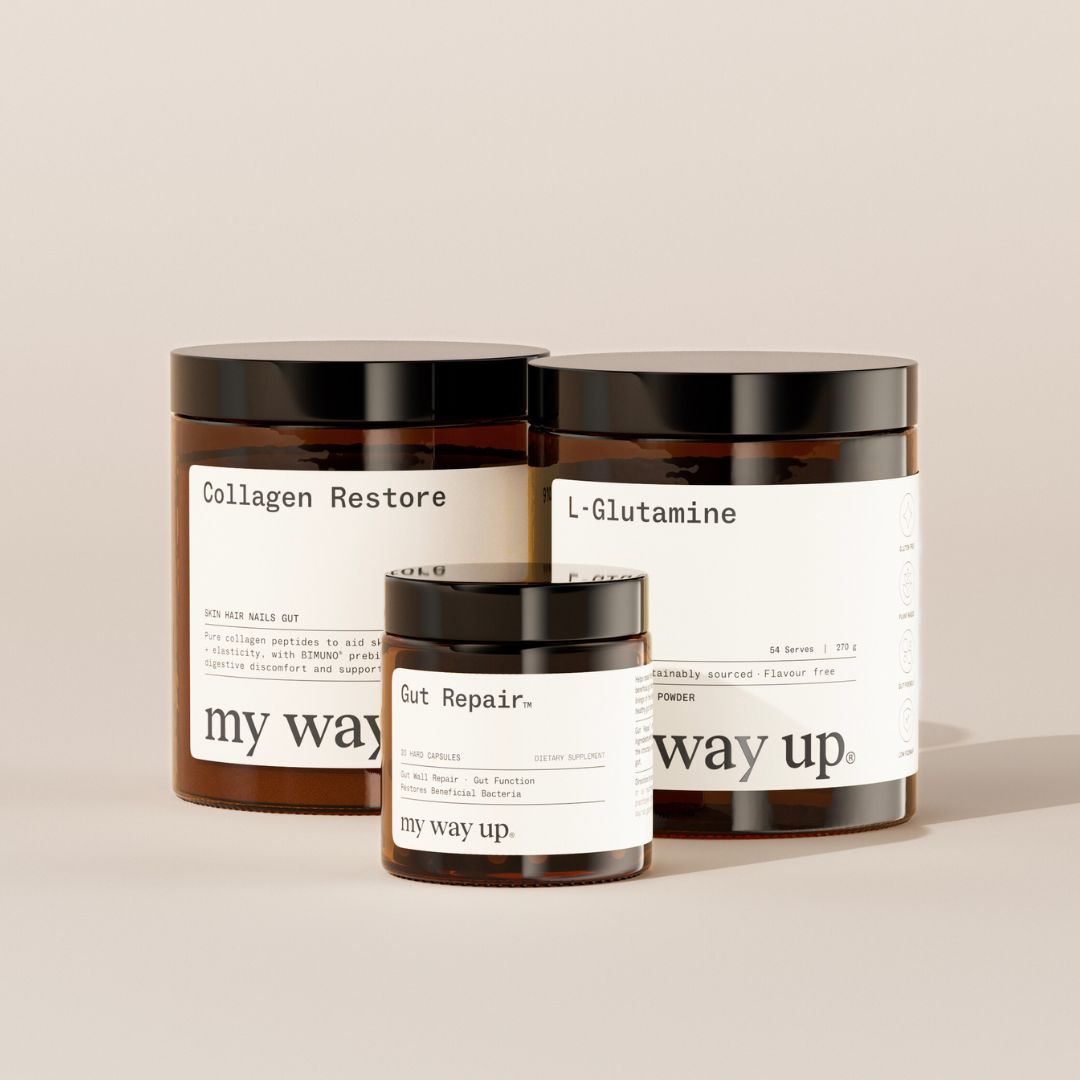Gut Smarter
“Leaky gut” refers to increased intestinal permeability, and is a root cause of bloating, food sensitivity, fatigue, problem skin, IBS and brain fog. Here are five practical, evidence-aligned habits that will help you repair your gut.

“Leaky gut” refers to increased intestinal permeability, and is a root cause of bloating, food sensitivity, fatigue, problem skin, IBS and brain fog. Here are five practical, evidence-aligned habits that will help you repair your gut.

Why it helps: Collagen provides glycine, proline, hydroxy proline—amino acids used in connective tissue and the gut’s extracellular matrix. Adequate building blocks support organized repair and a resilient barrier.
Real-world play: Add collagen-rich foods (slow-cooked meats, skin-on fish, bone broth) and/or10 g/day collagen peptides. Early research suggests collagen peptides may support gut barrier function (and they’re easy to stack with glutamine).

Our foundational product with ingredients to help repair the gut wall.
Why it helps: Your intestinal cells (enterocytes) love glutamine. It’s their preferred fuel and supports tight-junction integrity.
Evidence snapshot: In a double-blind RCT of post-infectious IBS with documented hyperpermeability, 15 g/day (5 g, 3×/day) for 8 weeks reduced permeability and improved symptoms versus placebo.Gut
How to use: Start 5–10 g/day and work up (common research dose: 10–15 g/day). Take on an empty stomach if tolerated.


Why it helps: This chelated complex sticks to the mucosa, supports mucus production, antioxidant defences, and tight-junction signalling—think of it as scaffolding for repair.
Evidence snapshot: In NSAID/aspirin-induced small-bowel injury, zinc-carnosine reduced mucosal damage and stabilized permeability in randomized studies; dosing commonly lands around 75 mg–150 mg/day(often split). BioMed Central+2BioMed Central+2
How to use: Follow label; typical patterns are 37.5–75 mg twice daily with food. (If you already take zinc elsewhere, total daily zinc matters—don’t overdo.)
Why it helps: Boswellic acids (esp. AKBA) help tamp down intestinal inflammation that keeps the barrier “leaky.” The phytosome format (e.g., Casperome®) improves bioavailability.
Evidence snapshot: Human pilot trials with Boswellia phytosome reported improvements in IBS-related symptoms and gut comfort; longer observational work suggests good tolerability for ongoing support.
How to use:Take as directed (commonly 250–500 mg/day of the phytosome form). Avoid if pregnant unless cleared by your clinician.


When healing a leaky gut, it's essential to consume high-quality, traditionally prepared foods.Think to yourself, what would my great-grandmother have eaten?
Those foods are usually going to be a great place to work from. Start by eliminating inflammatory foods that can exacerbate gut damage.
These include refined sugars and fats (like seed/vegetable oils), processed foods, and artificial additives. Focus on a nutrient-dense diet, rich in whole foods such as lean meats, well-cooked root vegetables, and easy-to-digest fruits (perhaps they are stewed with the skin removed).
What to expect: Many feel less bloating and better regularity in 2–3 weeks; barrier-level changes typically show up over 8–12 weeks. Keep going—gut tissue turns over, and steady inputs matter.

With clinically studied ingredients that target improvements to multiple aspects of gut repair, health and function.
My Way Up® has strict sourcing guidelines to ensure our content is accurate and current. We rely on peer-reviewed studies, academic research institutions, and medical associations.
This article is for informational purposes only and does not constitute medical advice. The information contained herein is not a substitute for and should never be relied upon for professional medical advice. Always talk to your doctor about the risks and benefits of any treatment. Learn more about our editorial standards here.